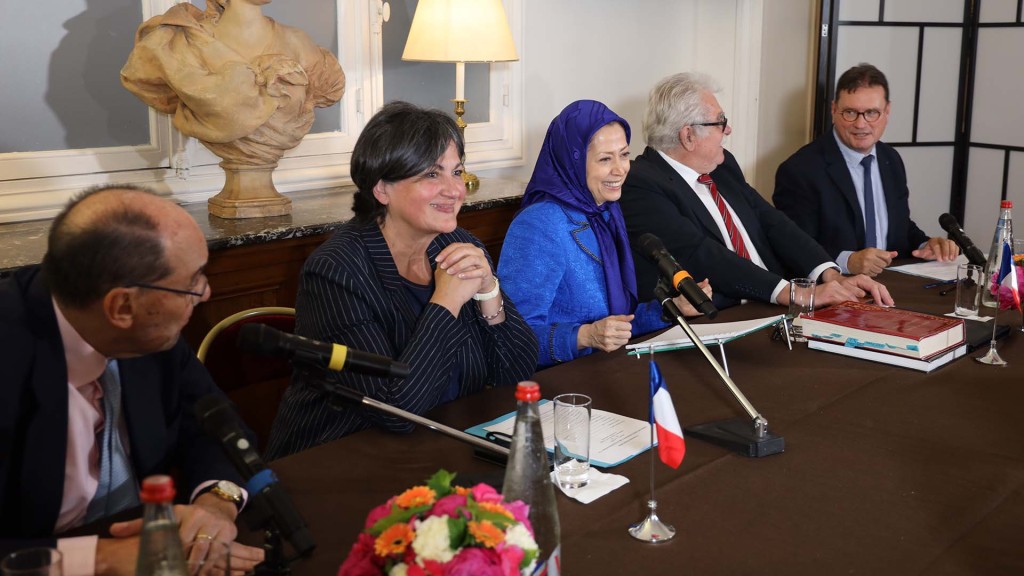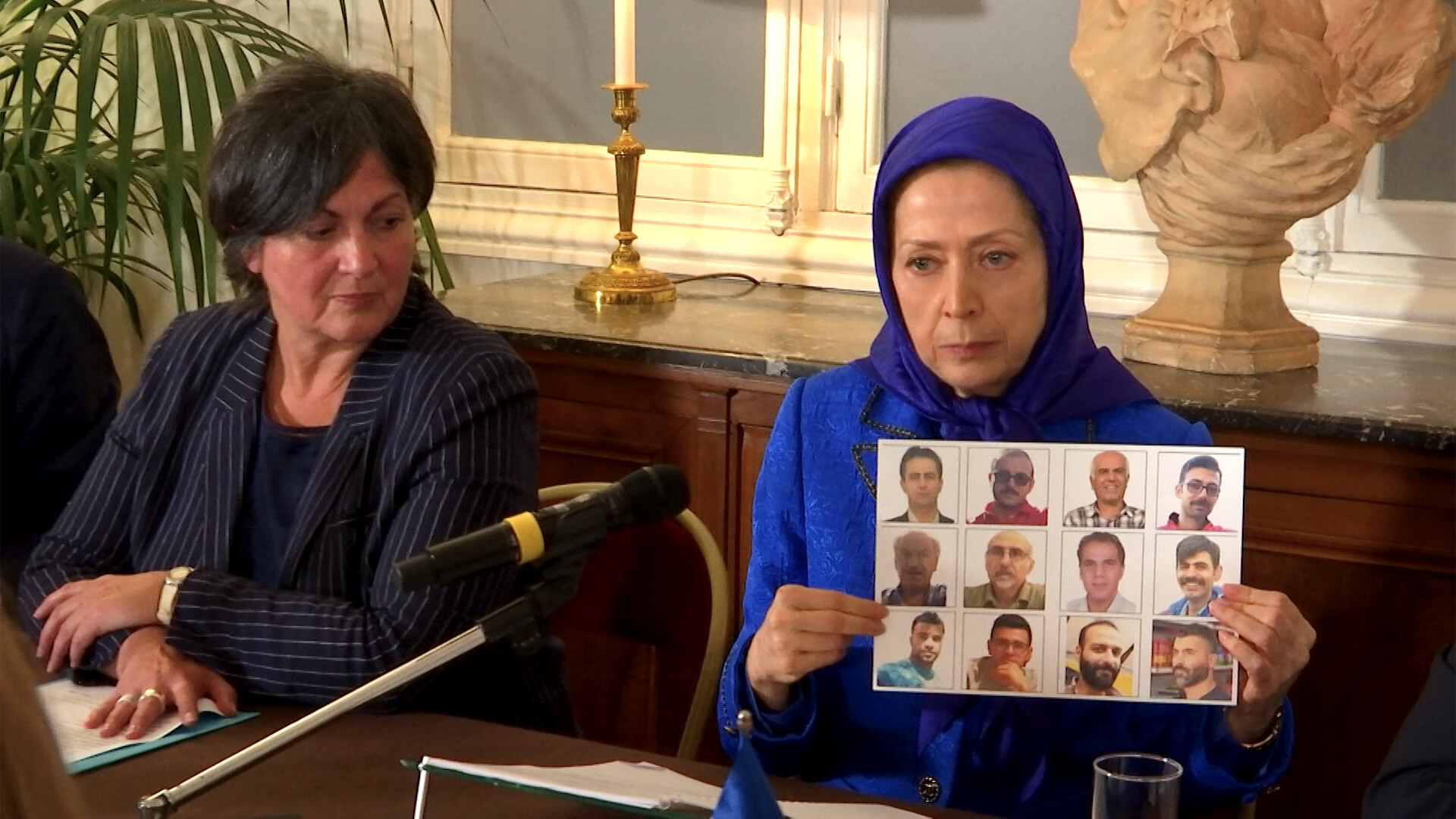Conference at the French National Assembly-May 2025

Maryam Rajavi: The Iran-2025 declaration is an example of a sound policy toward Iran
Dear Members of Parliament,
Mr. Vidal-Quadras,
Dear friends,
I am happy to see you.
Last year, during our meetings, especially in this very questure room, we sought to demonstrate that the religious dictatorship has constructed a false image of its power through executions, terrorism, and warmongering. Unfortunately, in both Europe and America, advocates of appeasement continue to perpetuate the illusion that this regime is strong.
However, today the world has begun to recognize its fragility.
If the mullahs’ regime truly had a solid foundation, it would not have so quickly lost its position and influence in Syria and Lebanon. During the fall of Bashar al-Assad, their numerous troops would not have retreated so rapidly in the face of rebel attacks.
The Iranian Regime’s Fundamental Weakness
Dear friends,
Now, I would like to draw your attention to the regime’s fundamental weakness in the face of the people and the resistance determined to overthrow it.
On May 6 of this year, Gholam-Hossein Ejeii, the mullahs’ chief of judiciary, admitted that around 90,000 protesters—many of them students and schoolchildren—were arrested during the 2022 uprising.[1]
In truth, the people of Iran, especially the younger generation, are in open rebellion against the regime. In the last week of April, the Ministry of Education officially signed an agreement with the police force, assigning them responsibility for implementing security measures and enforcing political control over students and teachers in schools and high schools.
Evin Prison is recognized worldwide as a symbol of tyranny in Iran, evoking comparisons to the Bastille in France. Yet, in the first week of this month, political prisoners inside Evin collectively chanted slogans against Khamenei. Courageously, the families of these prisoners held protests outside the prison. These acts of defiance reflect the current state of Iranian society.
Over the past year, workers, oil industry workers, teachers, nurses, retirees, and drivers have staged thousands of protests and strikes. Alongside them, the Resistance Units have been actively operating across the country daily, carrying out anti-repression actions.
In response, the clerical regime has resorted to brutal repression, carrying out 1,150 executions in the past Iranian year.
In recent months, death sentences against supporters of the People’s Mojahedin Organization of Iran (PMOI/MEK) have been on the rise in trials where defendants have no access to legal representation.

The Legacy of Three Decades of Appeasement
In short, the clerical regime is now surrounded by widespread public anger and dissatisfaction. Even Khamenei acknowledged this reality during a religious ceremony on March 31, when he stated that he does not anticipate a threat from the United States or Israel. Instead, he emphasized the threat of “sedition” from within the country, referring to the popular uprisings, and pledged to suppress them.[2]
We have consistently told this regime that it must retreat from its nuclear ambitions, its warmongering, and its domestic repression. And we have said to Western governments: if you believe you can compel this regime to abandon its pursuit of nuclear weapons and missile programs, do not hesitate to act.
But the experience of nearly three decades of negotiations is clear for all to see. Time and again, the regime has used talks as a tactic to buy time, only to press forward with the expansion of its nuclear facilities. If it were not seeking to build a bomb, it would not have squandered two trillion dollars of the Iranian people’s wealth on this effort.
Just three weeks ago, the Iranian Resistance revealed yet another secret nuclear site operated by the regime, located in the Semnan region, east of Tehran. This site is part of the regime’s infrastructure for developing a nuclear bomb.
As the Iranian Resistance has repeatedly stated, the first crucial step to preventing the ruling religious dictatorship in Iran from acquiring a nuclear bomb is to activate the snapback mechanism and reimpose the UN Security Council resolutions. This must be followed by the complete dismantling of the regime’s nuclear program, especially its uranium enrichment activities. The European Union, with France in a leading role, has a critical responsibility in this regard.
However, the only lasting solution to eliminating the regional and global threat posed by a nuclear-armed regime—the world’s leading state sponsor of terrorism—is regime change by the Iranian people and the Iranian Resistance. This is the path to establishing democracy and popular sovereignty in Iran.
The West must abandon the failed policy of appeasement, which has been proven ineffective for more than three decades. Instead, it must adopt a firm and decisive approach, such as France’s recent initiative to pursue legal action against the regime for hostage-taking.
It is therefore essential to call on the French government to designate the Revolutionary Guard Corps (IRGC) as a terrorist organization and to stand with the people of Iran in their struggle for freedom and democracy.
A Call to France and the International Community
Dear friends,
Today, Professor Alejo Vidal-Quadras is with us. In November 2023, he was the target of a terrorist attack orchestrated by the Iranian regime. Fortunately, with remarkable determination, he recovered his health. Today, stronger than ever, he continues to expose the crimes and conspiracies of the regime.
We call on France, Europe, and the entire international community to recognize the Iranian people’s struggle to overthrow the regime, as well as the Resistance Units’ fight against the Revolutionary Guards.
The National Council of Resistance of Iran advocates for a democratic republic, free from executions and torture, founded on gender equality, the separation of religion and state, the autonomy of ethnic groups, and a non-nuclear Iran.
We say: No to compulsory hijab, no to compulsory religion, and no to compulsory governance.
Dear friends,
May 27 marks the anniversary of the first meeting of the French National Council of Resistance in 1943, convened by Jean Moulin.
It is an opportunity to honor the values of resistance: courage, defense of the republic, justice, and respect for others.
We must pay tribute to the women and men who risked—and gave—their lives for the liberation of France from Nazi occupation.
This experience of resistance for freedom was echoed decades later with the founding of the National Council of Resistance of Iran by Massoud Rajavi in July 1981 in Tehran.
The Iran-2025 declaration, recently signed by a large number of members of the French National Assembly, is an admirable example of continuing the legacy of the French Resistance values through a sound policy toward Iran.
I extend my gratitude to all the signatories of this declaration.
[1] Tasnim news agency, May 6, 2025
[2] Website of the Office of Protection and Publication of Khamenei’s Works, March 31, 2025
- Tags: Maryam Rajavi, mullahs' regime, NCRI, people of Iran

